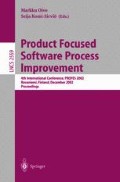Abstract
Knowledge Management spans on three abstraction layers: the first one is concerned with organisations, the second one regards engineering practices, and the third one is about tools. The organisation level encloses concepts strongly tied with strategies and resources management; the engineering level regards processes, methods and heuristics, tested or empirically validated, that support effective processes design, management and enactment; the third level comprehends software tools for storing and operating with knowledge. Currently, a major concern is a gap between the first and the second level in order to properly exploit theory and to cope with the nowadays turmoil of the marketplace. In this paper we propose a map linking a significant set of selected theories in knowledge management with a set of appropriate engineering practices able to realise them; furthermore we wish to determine the components from the third layer that are effective in making the selected engineering practices working in real contexts.
Access this chapter
Tax calculation will be finalised at checkout
Purchases are for personal use only
Preview
Unable to display preview. Download preview PDF.
References
Choo, C., W.: The Knowing Organization. How organizations use information to construct meaning, create knowledge, and make decision. Oxford University Press (1998).
Choo, C., W.: Sensemaking, Knowledge Creation, and Decision Making: Organisational knowing as emergent strategy. In: Choo, C.,W., Bontis, N. (eds.): Strategic Management of Intellectual Capital and Organisational Knowledge. Oxford Univ Press (2001).
Staab, S., Studer, R., Schnurr, H. P., Sure, Y.: Knowledge Processes and Ontologies. IEEE Intelligent Systems Vol.16 N°1 (2001) 26–34.
Guarino, N., Welty, C.: Evaluating Ontological Decisions with OntoClean. Communications of the ACM Vol.45 N°2 (2002) 61–65.
Chung, H.,M., Gray, P., Mannino, M.: Introduction to Data Mining and Knowledge discovery. Proceedings of Thirty-First Annual Hawaii International Conference on System Sciences (1998) 244–247.
Yen, S.,J., Chen, A.,L.,P.: An Efficient Data Mining Technique for Discovering Interesting Association Rules. 8th International Workshop on Database and Expert Systems Applications (1997) 664–670.
Cybenko, G.: Machine Learning. Computing in Science and Engineering Vol.3 N°3 (2001) 95–96.
Bischof, F., W., Caelli, T.: Scene Understanding by Rule Evaluation. IEEE Transactions on Pattern Analysis and Machine Intelligence Vol.19 N°11(1997) 1284–1288.
Rus, I., Lindvall M.: Knowledge Management in Software Engineering. IEEE Software Vol.19 N°3 (2002) 26–38.
Holsapple C., W., Joshi, K., D.: A Collaborative Approach to Ontology Design. Communications of the ACM Vol.45 N°2 (2002) 42–47.
Basili, V., R., Schneider, K., von Hunnius, J., P.: Experience in Implementing a Learning Software Organisation. IEEE Software Vol.19 N°3 (2002) 46–49.
Basili, V., R., Caldiera, G., Rombach, D., H.: The Experience Factory. In: Encyclopedia of Software Engineering. John and Wiley amp; Sons, New York (1994) 469–476.
Rus, I., Lindvall, M., Sinha, S., S.: Knowledge Management in Software Engineering. A State-of-the-Art-Report. Fraunhofer Center for Experimental Software Engineering Maryland and the University of Maryland for Data and Analysis Center for Software, Department of Defence, USA (2001): http://www.isr.umd.edu/~sachinss/KMSE_Sachin.pdf
Liebowitz, J.: A Look at NASA Goddard Space Flight Center’s Knowledge Management Initiatives. IEEE Software Vol.19 N°3 (2002) 40–42.
Wei, C., P., Hu, P., J., H., Chen, H., H.: Design and Evaluation of Knowledge Management System. IEEE Software Vol.19 N°3 (2002) 56–59.
Karypis, G.: Data Mining. IEEE Computing in Science and Engineering Vol.4 N°4 (2002) 12–13.
Stata, R.: Organizational learning: The Key to Management Innovation. In: Starkey, K.(ed): How organizations learn. Thomson Business Press, London (1996) 316–334.
Choo C.W.: Working with Knowledge: How Information Professionals Help Organisations Manage What They Know. Library Management Vol.21 N°8 (2000).
Wenger, E. (ed.): Communities of Practise: Learning, Meaning and Identity. Cambridge University Press, New Jork (1998).
Kolb, D.: Experiential Learning: Experiences as the Source of Learning and Development. Prentice Hall, Englewood Cliffs, NJ (1984).
Dingsøyr, T.: Knowledge Management in Medium-Sized Software Consulting Companies. An investigation of Intranet-Based Knowledge Management Tools for Knowledge Cartography and Knowledge Repositories for Learning Software Organisations. Tapir Trykkeri, Trondheim (2002).
Mack, R., Ravin, Y., Byrd, R.,J.: Knowledge Portals and the Engineering Digital Knowledge Workplace. IBM Systems Journal Vol.40 N°4 (2001).
Preece, A., Flett, A., Sleeman, D., Curry, D., Meany, N., Perry, P.: Better Knowledge Management through Knowledge Engineering. IEEE Intelligent Systems Vol.16 N°1 (2001) 36–43.
Davenport, T., H.: Knowledge Management Case Study. Knowledge Management at Miscrosoft. (1997). http://www.bus.utexas.edu/kman/miscrosoft.htm.
Basili, V., R.: Quantitative Evaluation of Software Engineering Methodology. Proceedings of the First Pan Pacific Computer Conference (1985).
Nonaka, I., Takeuchi, H.: The Knowledge-Creating Company: How Japanese Companies Create the Dynamics of Innovation. Oxford University Press, New York, NY (1995).
Argyris, C., Schön, D.,A.: Organisational Learning: a Theory of Action Perspective. Addison-Wesley, Reading, MA (1978).
Lehman, M., M.: FEAST/2 Final report-Grant Number GR/M44101. (2001). http://www.doc.ic.ac.uk/~mml/feast2/papers/pdf/683.pdf
Congla, P. Rizzuto, C.,R.: Evolving Communities of Practice: IBM Global Experience. IBM Systems Journal Vol.40 Nø4 (2001).
Author information
Authors and Affiliations
Editor information
Editors and Affiliations
Rights and permissions
Copyright information
© 2002 Springer-Verlag Berlin Heidelberg
About this paper
Cite this paper
Canfora, G., Cimitile, A., Aaron Visaggio, C. (2002). From Knowledge Management Concepts toward Software Engineering Practices. In: Oivo, M., Komi-Sirviö, S. (eds) Product Focused Software Process Improvement. PROFES 2002. Lecture Notes in Computer Science, vol 2559. Springer, Berlin, Heidelberg. https://doi.org/10.1007/3-540-36209-6_34
Download citation
DOI: https://doi.org/10.1007/3-540-36209-6_34
Published:
Publisher Name: Springer, Berlin, Heidelberg
Print ISBN: 978-3-540-00234-5
Online ISBN: 978-3-540-36209-8
eBook Packages: Springer Book Archive

